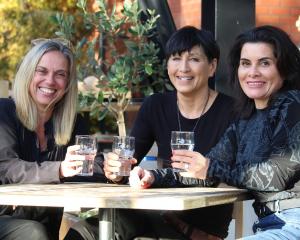Residents around the region were kept awake by a series of strong aftershocks on Monday night, including one of magnitude 5.2 and two of 5.4.
And, while the tremors were milder yesterday, Civil Defence has warned the area could be hit by another big aftershock.
The latest tremors closed at least two major public buildings after new cracks appeared, cracks in streets and homes widened and residents fled buildings and jumped out of bed and stood under doorways as the area shook again.
The blows to Christchurch, three days after Saturday's big quake, were softened a little yesterday when the Government announced an emergency $350-a-week subsidy for workers not being paid because of the Canterbury earthquake.
Prime Minister John Key says the move could cost up to $100 million.
More people have been turning to the welfare centres for help, too afraid to stay in their homes during the aftershocks, and some are wondering whether to stay in the city.
In Keller St, Avonside, where gangs of contractors were starting a major clean-up yesterday, residents said the aftershocks were the worst thing about the disaster.
John Buchanan said his ill wife had increased the number of tranquilisers she was taking in an attempt to relax sufficiently to be able to sleep.
Everyone expected the aftershocks, but it was still a "bit hard" to sleep.
"You're always wondering if it's going to get worse."Poorna Beri hoped the aftershocks would stop soon.
"It's scary, really scary. We can't sleep at all. On one tremor last night we jumped out of bed and stood under the door, because we don't know, is it going to get worse? It is absolutely terrifying."
Another neighbour said she and her partner now slept with torches in their hands.
They left the doors open while they were in the house because they had learned that doors jam shut in quakes, and had their bags permanently packed ready to run if necessary.
They had not considered running on Monday, but had a sleepless night, probably much like the rest of the city, she said.
While dozens of people from the street had been out clearing away silt on Monday, there were a lot fewer yesterday.
"I think everyone is just getting so tired."
Even emergency professionals found Monday night's aftershocks unnerving.
"I seriously thought about getting out of bed and getting my socks and pants on, and then it stopped," senior Dunedin firefighter Jason Hill said.
Territorial soldier Corporal Tim Rae said the soldiers in his camp had also been a "in a bit of a flap".
For the worst affected, aftershocks bring abject terror.
Kaiapoi resident Judi Pincott said Monday night's big shakes made her feel sick.
"My husband Clive and I jumped out of bed, stood under the doorway and braced ourselves."
When it died down, the whole family got up and gathered in the lounge and did not go back to sleep that night.
Now, she feared each shake so much that every little noise, including doors creaking and trucks driving past, made her jump.
She had been trying to hold things together emotionally until after she got everything out of her home, but the aftershocks on Monday had caused her to "melt down", she said.
"You expect them to get smaller, but they are just getting bigger - it's hard to deal with."
The Pincotts' Courtney Dr house is one of dozens in the street badly damaged by the quake, with all the homes on one side expected to be bulldozed.
Yesterday, removal trucks were being loaded all along the street as residents moved their possessions out of their wrecked homes, the Pincotts among them.
"We are just lucky we have such a wonderful community," Mrs Pincott said.
"We have got to know all of our neighbours really well, and everyone is helping everybody else.
"This was my dream home.. I have to say I never wanted to leave here, but at the moment, I just want to get away. I do not want to be here. I don't even know if I want to feel safe in Christchurch any more."
Monday night's quakes resettled silt, widened cracks in roads and buildings and moved sandbagging done by the army the previous day.
A removal man working in Kaiapoi yesterday said he would be returning to his Dallington home last night after a day of shifting other people, expecting to find his family and possessions would be next to move.
A crack in their lounge wall had widened to twice the size during the aftershocks.
Most concerning, Mrs Pincott said, was hearing aftershocks could get bigger.
"That's not exactly the kind of news you want to hear, when you're in this sort of state."
Authorities were forced to close the Burnside High School welfare centre where 71 people stayed on Monday night after cracks appeared in walls.
Christchurch Airport's domestic terminal was also affected yesterday morning after cracks appeared in the walls.
Demolition of buildings continued in the central city and suburbs yesterday and there were fears for the city's centrepiece, Christchurch Cathedral, where cracks were found.
Two historic buildings, the New Zealand Express Co Ltd and Cecil House, both in Manchester St, were condemned yesterday.
Orion chief executive Roger Sutton said he was confident power would be fully restored to all properties by the end of the week.
The cordon in the central business district has been shrunk and the Christchurch City Council said much of the central city had returned to normal.





